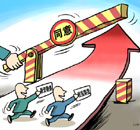Top Biz News
Index futures may trigger falls in small equities, says CICC
(China Daily/Agencies)
Updated: 2010-01-13 08:09
 |
Large Medium Small |
China's smallest stocks are poised to fall as the government's approval of index futures prompt investors to switch to larger equities that are half as expensive, according to China International Capital Corp (CICC).
A 131 percent rally in the CSI Small Cap 500 Index last year drove its price-earnings ratio to 76.5 times, compared with 39 times for the CSI 300 Index, which tracks the 300 biggest stocks traded in Shanghai and Shenzhen.
"Valuations for small-cap stocks are looking stretched and news of the approval of index futures may spur a rotation into large-cap stocks," Gao Ting, Beijing-based strategist at CICC, the top-ranked brokerage for China research in the annual survey by Asiamoney magazine, said in a phone interview yesterday.
The rally in the small-cap index reflects demand for equity investments by local retail investors, who made up 99.6 percent of trading accounts opened on Shanghai's stock exchange in the first 11 months of last year, based on data from China Securities Depository and Clearing Corp. The approval of index futures on Jan 8 may attract more institutional investors and boost shares of larger stocks including banks and automakers, according to CICC, partly owned by Morgan Stanley.
Morgan Stanley advised investors to buy shares of the index's largest companies by weighting, as well as brokerages. The new rules that includes margin trading and short selling may boost trading volumes by 50 percent "in the long term", it said.
Short sales
In a short sale, an investor borrows an asset and sells it, hoping to profit from a decline by repurchasing it later at a lower price. An investor arbitraging China might buy shares in Hong Kong and sell short the same company trading on the mainland.
"Big-cap stocks will be given a premium for their high liquidity, as index futures are expected to bring more market participants," said Chen Wenzhao, a strategist at China Merchants Securities Co.
The average market value in the CSI Small Cap index is 5.9 billion yuan, compared with 70.8 billion yuan for the CSI 300, on which the first stock index contracts will be based.
Gao also recommended automobile stocks because they will rebound as the government promotes domestic consumption and sales continue to grow.
SAIC Motor Corp has slid 14 percent this year after more than quadrupling in 2009. FAW Car Co, which makes passenger cars in China with Volkswagen AG, has slumped 15 percent after rallying 262 percent.
"The recent declines in automobile stocks present investors a buying opportunity," Gao said.













